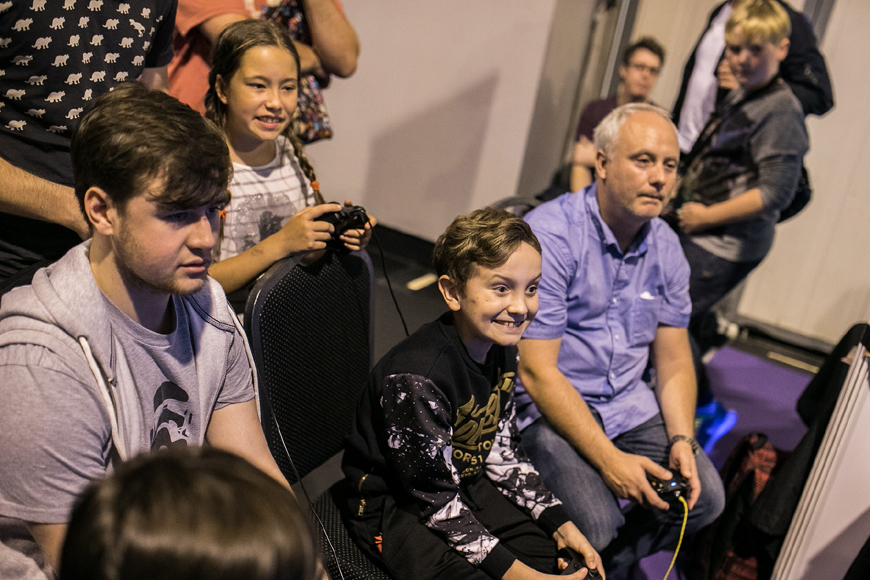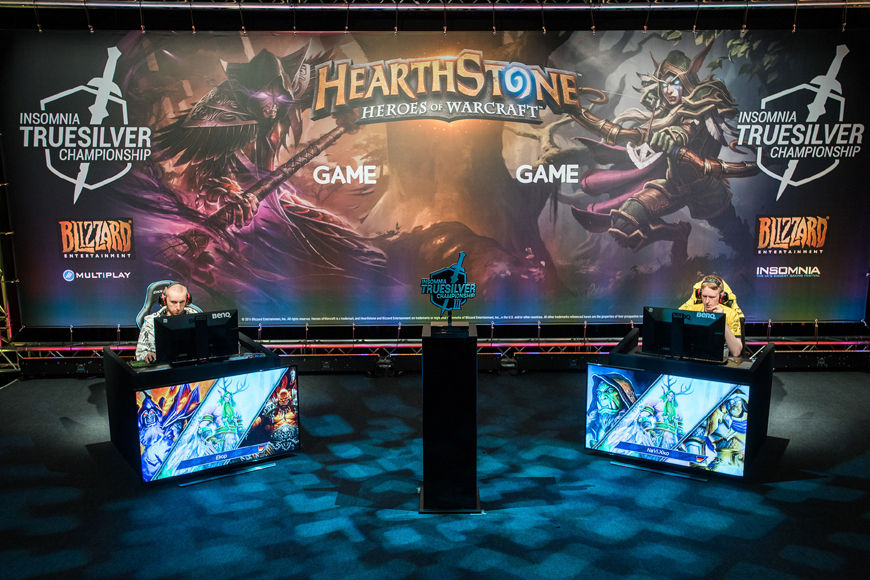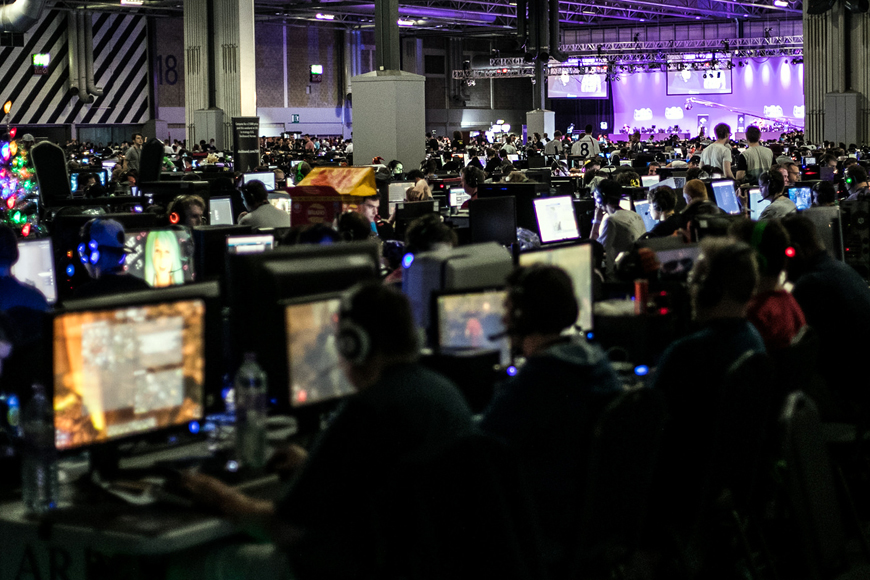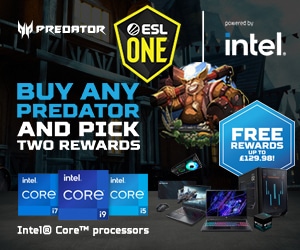In this long-form opinion piece, Team EndPoint CEO Adam “Adz” Jessop shares his thoughts on player power, how UK eSports has changed since his first Insomnia event at i12, the role of an amateur eSports organisation in the current climate and the recent UK League of Legends drama.
Recently, a lot has been said regarding ‘player power’ and how players should be protected within the eSports scene. Forg1ven slammed the Misfits organisation for contracting their players for a two-year period, and a little closer to home, Last Remedy have been effectively held to ransom by player demands and expectations.
There has been conversation about the UK eSports scene not having the money to support players, and the general outlook being bleak for a community that is regularly in disarray.
I have been around the eSports scene for a relatively long time now. In fact my first competitive gaming experience was playing the original Unreal Tournament (’99), which was at a time before some of today’s stars were even born. I remember that time well.
I associated myself with a team called Levitation, who were managed by a ‘real life’ friend of mine. It just so happened that they were one of the best teams around at the time, winning Eurocup after Eurocup (Clanbase of course), and I would often spend time on their Teamspeak server amongst people like Paul “Redeye” Chaloner and David “Zaccubus” Treacy.
My first Insomnia
My first insomnia event was i12. It was a small and cosy affair. We were on the ground floor of their new venue, Newbury racecourse, and only half of it at that. Everybody quickly got familiar with each other, as people arranged group games, with entire rows facing off against each other in various arenas.
Whilst we were embracing competitive gaming, ‘eSports’ wasn’t yet a thing. The term didn’t exist, and we had no idea where this exciting pastime would go. I was obviously too young at that stage to fully realise the potential, but in the years to come I would go on to form and grow Team Infused, with them becoming a major UK organisation. I spent the best part of five years running the organisation, and it was vastly different to the scene we have today.
Back then, players wanted to be part of an organisation. They wanted to belong. You could get a top tier UK line-up together on the promise of LAN attendance costs, and the players would jump through hoops to represent you. Of course there were still egos to manage, and negotiations to be had, but salaries were largely unheard of. I guess in most cases it was the luck of the draw.
You had to do your homework on who exactly you were going to pick up, and do your best to keep them happy in order to hold on to them. I have always prided myself on my player relations, and it definitely helped us solidify our position within the UK scene.
“One thing we thing we aren’t short of in the UK is egos. It’s as if some UK based players see others making it big elsewhere, and just expect that to be the case here on home soil. At present, it simply isn’t.”
I later went on to work within Fnatic for a 12-month period, occasionally living in Southampton with Joe Miller and James “2GD” Harding. This showed me what eSports was like at the top of the global scene. Player contracts were enforced, and money was at the forefront of everything they did.
Even in those days, everything was about the brand Fnatic had, and ensuring they had the best players in the world representing it. They were the pioneers. Sam Mathews did a great job in capitalising on early global tournaments, like the CPL, making his team one of the of the world’s first elite eSports brands.
Ultimately, after spending the best part of five years travelling Europe attending different eSports events, the global recession hit. Marketing budgets disappeared, and the world of eSports felt the effect in full force. We at Infused struggled.
We had to try and bring in some financial stability, and made the decision to merge with a smaller organisation who would bring in some much needed financial relief, in return for a piece of what we had. This was the beginning of the end for me really, as it simply didn’t work.
It got harder for me to justify what I was doing. I wasn’t making money, and now I had a smaller part of this potentially global brand. I lost my way and drive for eSports, and when real life situations and difficulties crept in, I had to make a decision. I had do what was best for me personally, so in early 2010 I sold my shares and walked away.
I left knowing that we had made a mark on the scene, and I wanted the Infused brand to continue to do so, but in reality, I was no longer a part of it. I had to let it go.
The birth of a new eSports generation
Despite my time with Infused ending, I was still an eSports fan, and I still believed in the market. I still had that passion. So after working hard and getting my career to a point where I was comfortable, I knew I had to get back into it. The timing seemed right, and eSports was bigger than ever.
Shoutcast was replaced by Twitch, Xfire was replaced by Steam, and IRC was replaced by Discord. This advancing technology was supporting the scene and aiding its growth. Not only that, but the tournaments were now bigger than ever. eSports is packing arenas, with the finals getting more viewers than traditional sporting events, and so brands are starting to wake up again.
I think eSports is starting to mature, and starting to prove that it isn’t a fad that kids go through. It’s a genuine emerging market. I decided to get back into eSports and try and pick up where I left off. However, this time I have matured. I have experience in running my own business, which together with the experience and lessons learned from my time with Infused, has led me to form EndPoint alongside Nick “Zai0s” Carpenter and Tim “Timmyy” Jollie.
Here in the UK however, we are some way behind the pack. We are desperate to be punching with the likes of the USA and other European countries, but we simply don’t have the infrastructure. We have the talent (that has never been a major issue), but most of our playing talent end up getting snapped up by overseas organisations to support line-ups elsewhere. At EndPoint, we recently lost Mark “Phantasy” Pinney to Mousesports, an organisation that were simply able to support him financially more than we are.
One thing we thing we aren’t short of in the UK is egos. Whilst a lot of things have changed in eSports over the years, this is one thing that has been ever prevalent in the scene. It’s as if some UK based players see others making it big elsewhere, and just expect that to be the case here on home soil. At present, it simply isn’t.
“The recent drama within the League of Legends UK scene was completely avoidable. It’s no secret that we at EndPoint were interested in picking up a League team, and we were actually in discussions with Last Remedy regarding taking over their line-up. But we were put off. The demands and egos just don’t appear to be worth the risk.”
In North America, there is much more of a startup and VC (venture-capital funding) culture than there is over here in the UK. Americans have embraced the eSports vertical, and are currently reaping the rewards. Some American colleges are even offering scholarships to eSports players. You can even get an A1 visa as an eSports player, which are typically reserved for traditional athletes.
Organisations over the pond are backed not just by private venture capitalists and investors, but publicly by ex-sports stars who have seen the opportunity within the market. In other European countries, governments have been quick to realise the potential of eSports, and have actively supported teams through various grants or even reliefs that have enabled them to organically grow much quicker than teams within the UK.
But whilst it has been hard for organisations to grow over here, the players demands have increased relative to growth elsewhere.
Player power & the role of eSports organisations today
If there is any immediate lesson I have learned since coming back onto the scene with EndPoint, it’s that player demands are massively different. Players expect full LAN support and will continuously search for wages.
Players are generally more clued up on the way that organisations work, and how exposure and results are the things we crave the most. Therefore, in exchange for delivering those, they expect to be compensated generously. I am not saying that is a bad thing, but whilst they are switched onto that, they appear to take for granted the things that were previously the holy grail of support.
The demands and costs of LAN support have increased dramatically, especially in the case of Insomnia. Tickets are £99 each, and hotels on the NEC complex charge a fortune. Also, travel and food expenses are more of an expectation. All this equates to a cost of around £300 per player. That’s £1,500 for a team of five or £1,800 for a team of 6. That is before considering the costs of any coaches and organisation staff etc. Taking a small cut of any winnings in a bid to recoup any of those high costs seems simply not worth it, as Insomnia doesn’t have the largest prize pots.
Ultimately it’s not a top tier event. It’s at an amateur to semi-professional level at best, plus eSports is not even Multiplay’s primary focus anymore. They have wised up to the fact that casual gamers still outnumber competitive ones, and they are able to bring in a lot more visitors by catering to the YouTube generation. But it’s an event that UK orgs feel like they HAVE to be a part of because it helps them keep their footing within the UK scene as a whole.
 Multiplay Insomnia events cater to a wide range of age groups and demographics nowadays (picture credit: James Lawson/iEventMedia.co.uk)
Multiplay Insomnia events cater to a wide range of age groups and demographics nowadays (picture credit: James Lawson/iEventMedia.co.uk)
On the flipside, you have ESL UK. These guys are working hard on supporting that primary eSports scene, and they offer a range of online tournaments that boast strong coverage numbers and LAN finals, often tied in with other events that gain a lot of exposure. What’s more, your attendance at those LAN finals is paid for! Travel, accommodation and attendance is all funded and managed to a precise level by ESL’s great team of staff.
I recently visited their facilities in Leicester, and it was interesting to meet up with an old colleague of mine, Rob “Morg” Black, who explained to me that essentially his job hasn’t really changed from his days with me at Infused. However, instead of planning event attendance and logistics for a single team, he is now doing it for the league/competition operator. The fact that it is no longer an individual team’s responsibility to do this is the single biggest change that he’s seen evolve within eSports over the years.
I will go on record here and state that as a young organisation, EndPoint take no percentage of winnings from any ESL (free to enter) competition. Why should we? We have a team promoting our brand, playing in a tournament that is predominantly online, and if they eventually make the finals, we don’t have to spend a penny. All the while we are getting the exposure that goes alongside it, which to us at this stage, is more valuable than taking winnings off disgruntled players, who will ultimately look for a better relationship elsewhere.
Misfits are probably the most recent example of a UK organisation that have managed to crack it, and they did that via that ESL model. They got a strong team together, and were able to win the ESL Premiership and carry that on through to the Challenger Series and eventually win that coveted spot in the EU LCS, bringing with it the exposure and opportunity that most organisations could only dream of.
However their recent call to contract players for a period of two years has been criticised, because ‘the players deserve more security’.
WHY? I was under the impression that we want eSports to grow and become a more professional sport, and whilst I don’t think we should necessarily follow the antiquated systems of traditional sports, contracts have worked well elsewhere and offer peace of mind to both parties involved.
“I think organisations need to wise up a little. Stop trying to get a percentage of money for an event that is free to you, where you are getting much needed exposure. I would also suggest sitting down with your players and figuring out what is important to them.”
I am a big football fan, so I will always draw parallels to it. Player contracts are often drawn for a length of anything between one to four years, because the team involved want to secure the services of a particular player that they think will help them achieve their ambitions. eSports is no different. Footballers can get injured or even lose their mojo, much in the same way as eSports players can.
Contracts offer that player something of a security blanket, in that they will receive a salary or compensation for the time that they dedicate to the cause. Meanwhile, the organisation works hard to ensure they can fulfill that promise, and ultimately continue to strengthen the team they are building.
From the player’s point of view, they may not always be played. A better player may eventually come in to replace them, even if they have time remaining on their contract. They will however still continue to receive their compensation, because they are in the team’s reserves, ready to be called into action whenever needed. The model isn’t perfect of course.
Hell, football players are constantly in the press, pushing for moves onto bigger and better things, but ultimately, they signed that contract. More often that not, any disputes will want to be resolved efficiently by the controlling team, so not to damage their image and reputation, but they have to protect themselves. Buyout clauses are a great way of doing that. If you pick up a player based on potential you see in them, and are able to agree on a contract where both parties are happy at that time, then why should another organisation be able to take him away free of charge, as his or her talent starts turning more heads?
Sure, the player may be lured away by offers of more money and may ultimately realise that he or she would be better off elsewhere, but for the past so many months, the organisation they haved played for have been paying them a monthly amount of money and pushing them to compete at the highest level.
The organisation are entitled to a break for taking that financial risk, and undertaking that hard work and sacrifice, just as much as the player is. If the other team want the player, then they should be willing to pay a small sum of money as part of any negotiations.
I think Misfits should be applauded for their efforts, and for coming to an agreement where both parties are happy (or they shouldn’t have signed it) and they are able to hang on to their assets for a minimum of two years.
What can be done to improve the situation?
So what needs to change on the whole? Generally I think organisations need to wise up a little. Stop trying to get a percentage of money for an event that is free to you, where you are getting much needed exposure. I would also suggest sitting down with your players and figuring out what is important to them.
If it’s financial compensation, so that they are able to compete in the ESL model and dedicate the time needed to be the best, then do that. But if that is the case, maybe they have to sacrifice you ploughing money into Insomnia events three times a year. There has to be a negotiation point. I am not against the Insomnia events, and I have been to more than most, but is it really forwarding you as an organisation?
The exhibition hall is a great place to network and talk to people who are embracing the market, but you don’t need a three-day BYOC ticket to go there. Players, if you want to go there because you want a shot at the prize money, be prepared to give up a chunk of it for the high financial risk and cost to the organisation.
 Players should remain professional at Insomnia/LAN events when representing an organisation, says Adam Jessop (picture credit: David Portass/iEventMedia.co.uk)
Players should remain professional at Insomnia/LAN events when representing an organisation, says Adam Jessop (picture credit: David Portass/iEventMedia.co.uk)
Whilst I am at it, you are there to represent your organisation, not to have a jolly. You are expected to represent them professionally in return. Organisations put a lot of effort into events, both financially and general support. If you ever need any assistance at that event, it is absolutely the responsibility of the organisation managers to resolve any issues for you. Player-management relationships are a two-way street. We we will bend over backwards for you, just as long as you respect the work we are doing.
Organisations, there is nothing wrong with treating your players as individuals. Yes, you want them to work together as a team and don’t want to risk upsetting the apple cart, but if that 16-year-old wonder kid doesn’t need the financial support, and is happy to work hard to progress his ‘eSports career’, then perhaps use his share to pay your experienced veteran, who has bills to pay, a little bit more.
Organisations should be focused on getting their team to the top of their scene, and supporting their progression within it, not trying to gather UK event medals using the first mix team that ‘promises’ you a result.
Potential partners and sponsors generally aren’t really bothered if you win an event. They are more interested in what reach you have established because of that result. If you get a LAN win, then great, keep that team with the potential, build on it, and move onto the next step. Lets try and push for stability, as everyone knows we need it.
‘Don’t run an eSports team to get a return’ – Richard Lewis offers advice to UK orgs
The two most prominent scenes in the UK – CSGO and League of Legends – are rife with regular roster changes and people jumping around, just waiting to get lucky. Players know the UK scene is poor, but instead of trying to get their team or organisation to the top level, they are instead hoping that their team, or even just themselves, get picked up by one of the big overseas organisations. Instead of thinking with that singular mentality, why can’t we all work to the greater good?
The recent drama within the League of Legends UK scene was completely avoidable. It’s no secret that we at EndPoint were interested in picking up a League team, and we were actually in discussions with Last Remedy regarding taking over their line-up. But, the fact of the matter is that we were put off.
The demands and egos just don’t appear to be worth the risk. Yes, the end prize is attractive, but at what cost if it is simply not reached? We have to think like a startup business, because ultimately, that’s what we are. Quite simply, we feel that our resources and efforts may be better focused elsewhere. This is a first-hand prime example of how a scene with so much potential is damaging itself, with simple immaturity and egotistical behaviour.
“Players, you are at LAN to represent your organisation, not to have a jolly. You are expected to represent them professionally in return. Organisations put a lot of effort into events, both financially and general support. If you ever need any assistance at that event, it is absolutely the responsibility of the organisation managers to resolve any issues for you.”
We are close, but yet so far. The opportunities ARE there, and there are companies wanting to get into the market, but professionalism and stability goes a long way. Let’s show them that as a scene we are capable of so much more, and this is definitely a localised market they need to take notice of.
We don’t need more ‘player power’, instead organisations need to be smarter, and we need to all be working together to achieve the same goals.
 About the author
About the author
Adam “Adz” Jessop is the CEO of UK eSports organisation Team EndPoint.
He originally set up Team Infused in 2005 and co-managed the organisation until early 2010.
After focusing on his career as a developer for a few years, he has returned to eSports and launched EndPoint. Check out our video interview with Adam Jessop here.
Web: Endpoint.gg
Twitter: AdamJessop
Facebook: TeamEndpoint



